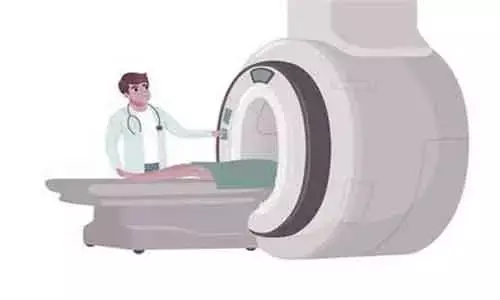- Home
- Medical news & Guidelines
- Anesthesiology
- Cardiology and CTVS
- Critical Care
- Dentistry
- Dermatology
- Diabetes and Endocrinology
- ENT
- Gastroenterology
- Medicine
- Nephrology
- Neurology
- Obstretics-Gynaecology
- Oncology
- Ophthalmology
- Orthopaedics
- Pediatrics-Neonatology
- Psychiatry
- Pulmonology
- Radiology
- Surgery
- Urology
- Laboratory Medicine
- Diet
- Nursing
- Paramedical
- Physiotherapy
- Health news
- Fact Check
- Bone Health Fact Check
- Brain Health Fact Check
- Cancer Related Fact Check
- Child Care Fact Check
- Dental and oral health fact check
- Diabetes and metabolic health fact check
- Diet and Nutrition Fact Check
- Eye and ENT Care Fact Check
- Fitness fact check
- Gut health fact check
- Heart health fact check
- Kidney health fact check
- Medical education fact check
- Men's health fact check
- Respiratory fact check
- Skin and hair care fact check
- Vaccine and Immunization fact check
- Women's health fact check
- AYUSH
- State News
- Andaman and Nicobar Islands
- Andhra Pradesh
- Arunachal Pradesh
- Assam
- Bihar
- Chandigarh
- Chattisgarh
- Dadra and Nagar Haveli
- Daman and Diu
- Delhi
- Goa
- Gujarat
- Haryana
- Himachal Pradesh
- Jammu & Kashmir
- Jharkhand
- Karnataka
- Kerala
- Ladakh
- Lakshadweep
- Madhya Pradesh
- Maharashtra
- Manipur
- Meghalaya
- Mizoram
- Nagaland
- Odisha
- Puducherry
- Punjab
- Rajasthan
- Sikkim
- Tamil Nadu
- Telangana
- Tripura
- Uttar Pradesh
- Uttrakhand
- West Bengal
- Medical Education
- Industry
Fast track allergy workups may prevent MRI contrast reactions in kids

Radiologists can prevent pediatric patients from experiencing adverse allergic reactions in follow-up gadolinium-enhanced MRI scans,by administering a "fast-track allergy workup.The findings of the research have been published in PLOS One.
Gadolinium-based contrast agent (GBCA)-enhanced magnetic resonance imaging (MRI) scans often must be used repeatedly in pediatric oncologic patients. Although GBCAs are usually well tolerated, severe and life-threatening allergic reactions might occur, which can result in overly cautions adherence to special precautions in patients.
The researchers conducted a study to evaluate the management of the reported GBCA-associated adverse reactions in subsequent contrast-enhanced MRIs in pediatric patients, distinguishing non-allergic and allergic reactions.
The researchers retrospectively found 2,109 patients (mean age, 7.86 ± 5.91 years) who underwent a total of 8,156 GBCA-enhanced MRI scans for intracranial lesions at their facility between January 2007 and December 2016 to determine the efficacy of their approaches.
The patients' history was evaluated with regard to any adverse events after GBCA administration. In a subset of patients with reported adverse reactions, the institutional premedication regime or an allergy work-up in clinical practice were performed, using either skin-prick tests or intravenous provocation tests in a double-blind procedure.
The researchers used either a skin prick test or injected a series of gadolinium-based contrast agents (GBCAs) under strict surveillance into pediatric patients, if they reacted poorly in an initial contrast-enhanced MRI scan. Both approaches helped to identify a GBCA the children could tolerate, and subsequent MRI scans were performed without incident.
They counted a total of 19 acute adverse reactions (0.23%) in 17 patients (0.81%) in their review. Two patients each had a second adverse reaction with another GBCA.
Of the 17 patients who initially experienced an allergic reaction, 12 children underwent skin prick tests or intravenous provocation tests before their next GBCA-MRI. None of the dozen patients experienced an allergic reaction on their follow-up MRI, with at "least one well-tolerated GBCA identified in almost every tested patient," the authors noted.
They concluded that a fast-track allergy work-up can help to distinguish non-allergic and allergic reactions and to identify a well-tolerated GBCA, thus avoiding unnecessary premedication for subsequent GBCA administrations.
For further reference log on to:
Hojreh A, Peyrl A, Bundalo A, Szepfalusi Z (2020) Subsequent MRI of pediatric patients after an adverse reaction to Gadolinium-based contrast agents. PLoS ONE 15(4): e0230781. doi:10.1371/journal.pone.0230781
Dr Kamal Kant Kohli-MBBS, DTCD- a chest specialist with more than 30 years of practice and a flair for writing clinical articles, Dr Kamal Kant Kohli joined Medical Dialogues as a Chief Editor of Medical News. Besides writing articles, as an editor, he proofreads and verifies all the medical content published on Medical Dialogues including those coming from journals, studies,medical conferences,guidelines etc. Email: drkohli@medicaldialogues.in. Contact no. 011-43720751


